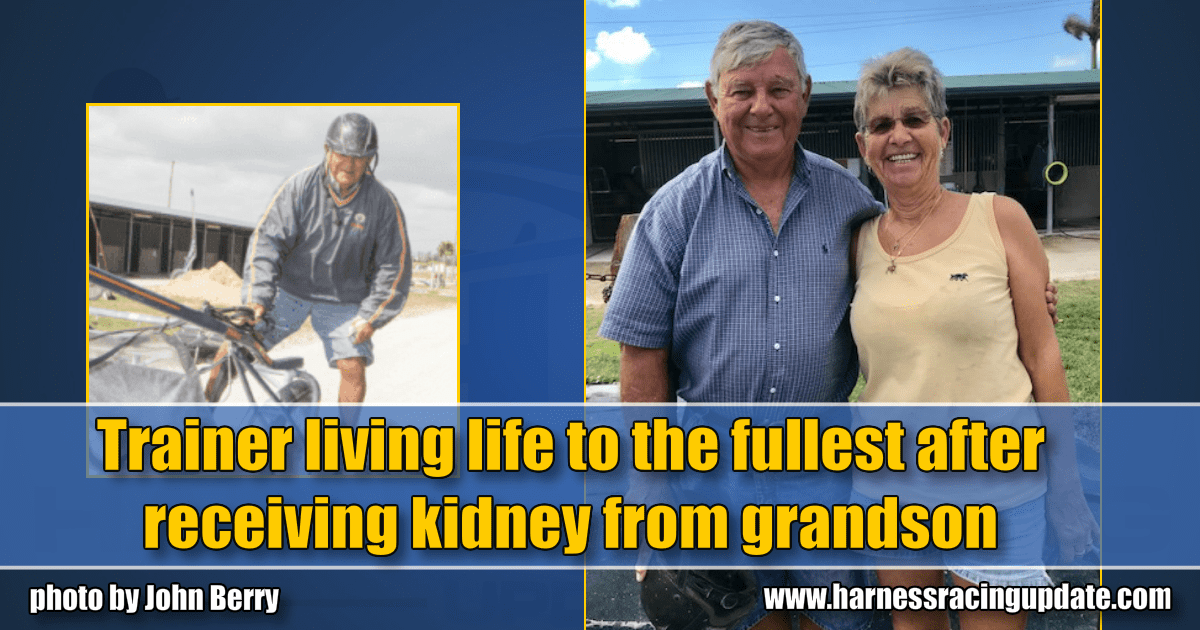Murphy living life to the fullest after receiving kidney from grandson
The Pompano-based trainer now brings as much energy to the game as any 73-year-old has a right to expect.
by Tom Pedulla
One year ago, trainer Mike Murphy needed a step stool to climb into a jogging cart each morning at Pompano Park (full story here). His color was poor and he tired easily, symptoms related to kidneys that were functioning at 12 per cent of their capacity.
Now, the step stool is a distant memory. So is his pallid appearance. And Murphy brings as much energy to the game as any 73-year-old has a right to expect.
The world of difference stems from the donation of a desperately-needed kidney from his grandson, Jacob Fox. The two men underwent transplant surgery last May 24 at Jackson Memorial Hospital in Miami.
“Everything has worked out fine,” Murphy said. “You’ve got to think God had a hand in it, and I definitely do.”
Murphy and Fox, 34, have long enjoyed an uncommon bond. When Fox was four years old, he would climb into the jog cart with Murphy and sit in his lap.
“My dad was never around, so he was pretty much my dad and my grandfather,” Fox said. “In the summer and the winter, any time I was out of school, I was with him. The least I could do was give him a kidney, right?”
The decision might not have been so clear for someone with a shorter memory. The procedure was not without risk, especially for Murphy. He had never required an operation of any kind or dealt with any major health issue before his kidneys began to fail.
“They explained to me there is always a chance you won’t come out of a surgery like that,” Murphy said. “Luckily, I made it out.”
According to Murphy, he experienced the benefit of the four-hour operation very quickly. The transplanted kidney immediately began functioning at full capacity, ridding his body of impurities that had built up.
“The next day after surgery,” he said, “I felt much better than I had in a long time.”
Fox, an assistant trainer at Hoosier Park, said he returned to work after a six-week absence. “I’m fine. I don’t have any difference at all,” he said. “I still go to the gym. I still drink beer. I’m still good to go.”
His grandfather’s recovery was much slower, but sure. He was back at the barn after a six-month recuperation.
Murphy and his wife, Barbara, his erstwhile assistant, never considered retirement. They are not about to contemplate it any time soon.
“My dad, God bless him, he worked his whole life and raised nine kids and when he retired, he retired,” Murphy said. “He stopped living, really, is what he did. He didn’t last long when that happened.
“I made up my mind that I wasn’t going to do that. I’d rather be walking around the barn than sitting in a chair at home.”
Barbara, 74, relishes each morning at the track with her husband. “It’s wonderful because it’s been going on forever,” she said. “It’s something we’ve always done.” They plan to continue spending winters at Pompano Park before shifting to Hoosier Park.
They are willing to slow down. They currently train three horses, down from eight last spring. The trio is led by Four Socks, a hard-hitting 9-year-old pacer. He returned from a recent layoff with two victories after Murphy drove him in a pair of qualifiers.
In the only visible sign that Murphy is a transplant patient, he estimates that he wears a mask on his face approximately 80 per cent of the time because his body is prone to infection.
“I’m just being cautious,” he said. “I don’t want to go through all that and use my grandson’s kidney and mess it all up.”
He estimated that he takes 23 pills a day as part of a routine that begins at 7 a.m. The medication is designed primarily to keep his body from rejecting the transplanted organ even though Jacob was found to be what doctors described as a “perfect match.”
Life is not perfect, but Mike and Barbara again talk excitedly about the future, including what is sure to be a jubilant family reunion. They also are passionate about the importance of organ donations. There are thousands of patients who urgently need transplants of all kinds and cling to the hope that suitable donors can be found.
Murphy hopes it is an obvious decision for people to signal their willingness to donate whatever can be used. “When you’re gone, you’re gone. You’re not coming back,” he said. “If you can help somebody live a little longer or have a healthier life, then why not?”
Barbara said of the importance of organ donation, “When you’ve been through this, you know how important it is.”

















